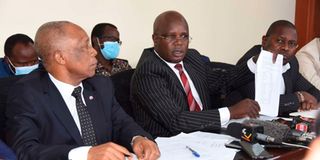Dons demand Sh1.65bn in pay arrears, compliance with CBA

Secretaries-general Albert Njeru (Kudheiha), Constantine Wasonga (Uasu) and Charles Mukhwaya (Kusu) at Uniafric House in Nairobi on December 9,2021.
A new report has revealed the billions owed to dons as their row with universities threaten to paralyse learning.
In the report, public universities owe salary arrears amounting to over Sh1.65 billion, which unions say have accumulated for over three years. The document was jointly prepared by the Inter-Public Universities Councils Consultative Forum of the Federation of Kenya Employers (IPUCCF) and three staff unions.
The unions are the Universities’ Academic Staff Union (Uasu), the Kenya Universities Staff Union (Kusu) and the Kenya Union of Domestic, Hotels, Educational Institutions and Hospital Workers (Kudheiha),
Egerton University staff are currently on strike after a push to have their salaries released failed.
In the September-December semester alone, staff in different universities went on strike, demanding the release of their pay.
A nationwide strike issued by Uasu in August was suspended by court. Nonetheless, staff members from Multimedia University, the Meru University of Science and Technology, Egerton, Moi, and Cooperative universities defied the orders and went on with on-campus demonstrations.
Sh8.8 billion
Those at the Technical University of Kenya (TUK) announced plans to picket on campus but were stopped.
The unions demand that all universities pay salaries uniformly. The government allocated Sh8.8 billion, of which the first tranche of Sh6.6 billion was disbursed by the National Treasury to the universities on July 3, 2020.
“The public universities utilised the funds to pay the arrears of basic salaries for 2017/18; 2018/19 and 2019/20 financial years as per the interim orders issued by the Employment and Labour Relations Court on July 3, 2020,” reads the report.
The second tranche of Sh2 billion, which is Sh200 million less than the initial allocation, was provided in the 2021/22 budget and is being disbursed as part of monthly capitation with effect from July 2021. The money was part of the 2017-21 collective bargaining agreements (CBAs) signed on October 28, 2019, between IPUCCF and the unions.
As of July 2021, the report reveals that only 19 universities placed staff diagonally in accordance with the CBAs. Nine other universities applied different versions of horizontal placement, which factored in only some annual increments to the basic salary, while 10 universities are paying the staff using old CBA rates.
The unions say the horizontal method violated the staff terms and conditions and resulted in demonstrations. They say the method resulted in numerous demotions of staff who were moved back by three years to lower salary grades. “The placement of staff using the horizontal method was advantageous to newly employed and promoted staff when compared with longer-serving [colleagues] at the same notches,” the report reads.
Workforce
Public universities cumulatively have a 31,373-member workforce. Those with the biggest staff sizes include the University of Nairobi with 4,626, Kenyatta (3,246), Moi (2,783), the Jomo Kenyatta University of Agriculture and Technology (2,732), Egerton (1,821), TUK (1,552), Maseno (1,235) and Kisii (1,137).
Uasu secretary-general Constantine Wasonga said only 25 universities had placed staff in line with the signed CBAs as of December 1.
Kusu secretary-general Charles Mukhwaya said for the first, three years after the signing of the CBA, universities retained part of the salaries meant for workers’ accumulating arrears.
“We are ready to stand with our members to ensure they get what is rightfully theirs. This is because the government disbursed the monies to the universities,” said Dr Mukhwaya.
Kudheiha Secretary General Albert Njeru said university workers have remained in the same job group over the years, despite the CBA. “We are not going to allow that, public universities should take responsibility and release the salary arrears.”
Benefits
On pensions, the report shows that some universities had disparities in the rates contributed by the employer to the retirement benefits schemes for various cadres of staff. Also cited are cases where some cadres of permanent staff were not paid pension despite their eligibility.
In some universities, they paid different rates of gratuity to contractual staff, while others had not paid gratuity arrears earned within the CBA cycle.
The unions want the universities to reconvene a joint committee to address the findings of the audit of 2017-21 CBA implementation and report back to the Joint National Implementation Committee. They also demand members of staff on contract be paid annual increments in accordance with fair labour practices and the Salaries and Remuneration Commission guidelines to cushion them from inflation and erosion of purchasing power.
On January 15, the labour court ordered the CBA to be fully implemented except for the clause on retirement age.





